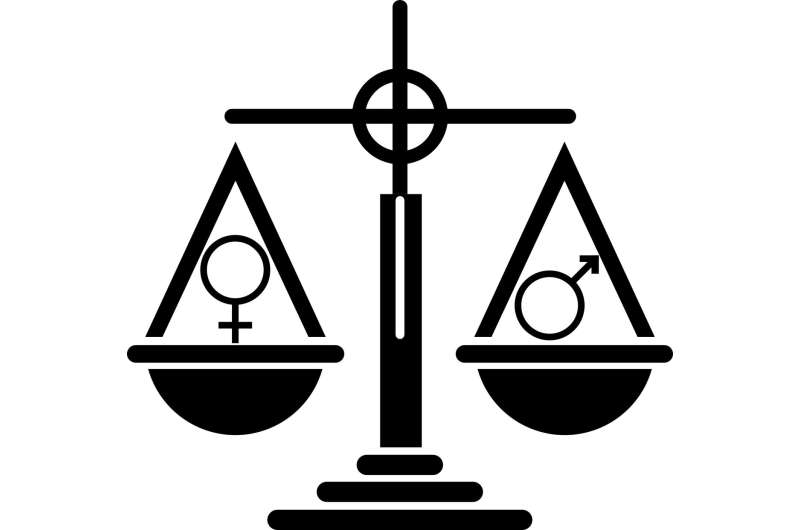New study reveals gender bias in sport research. It's yet another hurdle to progress in women's sport

Throughout history, sports have been guilty of prioritizing certain groups at the exclusion of others. There has been a pervasive idea that being an athlete requires the demonstration of traditionally masculine traits. Any individual not doing so was, and often still is, susceptible to being harassed, sidelined, or ostracized.
Indeed, femininity has historically been considered nonathletic. Research finds some athletes describe a perception that being a "woman" and an "athlete" are almost opposing identities.
For these reasons and more, women's sport has been held back in ways that men's sport has not. While progress is certainly now being made, our new research, published this week, finds large gender gaps persist in sports research.
We found sport psychology research studies—which inform the strategies athletes use to reach peak performance—have predominantly used male participants.
For example, across the sport psychology research we looked at between 2010 and 2020, 62% of the participants were men and boys. Further, around 22% of the sport psychology studies we examined had samples with only male participants. In contrast, this number was just 7% for women and girls.
Women may experience sport and exercise differently from men. As in other areas of medicine, an evidence base that's predominately informed by men's experiences and bodies will lead to insufficient, ineffective outcomes and recommendations for women.
Some progress has been made
Progress in women's sport is evident, and continues every year. Gender gaps across recreational and professional sport are slowly narrowing.
Girls' involvement in sport continues to grow, with the number participating in high school sports in the United States increasing by 262% between 1973 and 2018. In Australia, participation in sport among women and girls between 2015-2019 grew at a faster rate than among men and boys.
Improved opportunity and exposure has also occurred in professional settings, and public interest has increased significantly. For example, the 2020 Women's Cricket World Cup saw attendance records tumble, with the final played at the MCG in front of 86,174 fans.
Many sports now enter a complex new era of professionalization, as we're seeing in AFLW.
Despite positive trends, critical issues remain.
Gender bias in research
Any growth in women's sport must be supported by the underlying evidence base that informs it.
As mental health researchers in the field of elite sport, we aim to make real-world impacts through rigorous applied research. Our team has previously explored gendered mental health experiences among elite athletes, finding women report more significant symptoms of mental ill-health and more frequent negative events like discrimination or financial hardship.
Research like this is critical for informing the services and systems which support peak performance. But the research has to represent its target, or else progress will be limited.
It's now well understood that the field of medical and scientific research is rife with examples of the ways in which unequal participation by gender has caused negative health effects. With men's experiences and bodies considered the norm, inaccurate understanding of causes, tools, and treatments have been frequent.
Medical and scientific research in sport is not exempt.
Our findings
As sports become increasingly competitive and pressurized, sport psychology is critical to supporting athletes within these high-stress environments.
Following concerns about gender bias in scientific research, we wanted to understand whether the field of sport and exercise psychology was appropriately representative.
We recorded the gender of study participants across research published in key sport and exercise psychology journals in 2010, 2015 and 2020, to estimate gender balance over the last decade. This included studies on topics such as: physical and mental health, personality and motivation, coaching and athlete development, leadership, and mental skills.
Across more than 600 studies and nearly 260,000 participants, there were significant levels of gender imbalance.
This imbalance varied, depending on the area being investigated. While sport psychology research focuses on performance and athletes, exercise psychology is more focused on areas of health and participation. Our findings showed that the likelihood of including male rather than female participants in sport psychology studies was almost four times as high as for exercise psychology.
We also identified that those studies which specifically explored themes relating to performance (such as coaching, mental skills, or decision-making) all featured samples with fewer women and girls, as compared to those focused on topics like health, well-being, or activism.
What our findings mean
Our findings, along with those of others, hint at a number of worrying conclusions.
Women and girls in sport are likely to be instructed in strategies and approaches informed by research that does not sufficiently represent them.
Among many factors, topics like coaching methods, injury management, and performance psychology are critical to sports performance. For some or all of these, women athletes' experiences may differ from those of men.
Changes to policy have made a significant difference to gender equity in sport. But researchers and funding bodies must follow suit, ensuring we develop the understanding and methods to properly represent all groups we seek to serve. Only then can women's sport truly flourish.
This article is republished from The Conversation under a Creative Commons license. Read the original article.![]()





















